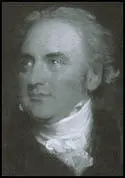Astley Cooper

Astley Paston Cooper, the son of Dr. Samuel Cooper, a clergyman, was born in Brooke, Norfolk on 23rd August, 1768. At the age of sixteen he became a medical student at St. Thomas' Hospital in London. He studied under Henry Cline and John Hunter.
Henry Cline had radical views on politics. According to Druin Burgh, the author of Digging up the Dead (2007): "Henry Cline... believed that parliamentary representation should not be the property of rich landlords, and that the payment of taxes brought with it the right to have a say in how they were spent, a right to a voice in the running of the country."
Henry Cline introduced Cooper to friends such as John Thelwall and John Horne Tooke, who were active in the campaign for parliamentary reform. Both men were eventually imprisoned for their beliefs.
Cline also supported the French Revolution claiming that the "French revolution was a glorious cause for a man to shed his blood in." Cooper visited Paris during the revolution and observed what became known as the September Massacres when almost 1,500 people were killed. Cooper managed to escape back to London. He later wrote: "A revolution may sometimes be a good thing for posterity, but never for the existing generation for the change is always too sudden and violent."
In 1789 Cooper was appointed demonstrator of anatomy at the hospital. Two years later he became joint lecturer with Henry Cline in anatomy and surgery. In 1800 he was appointed surgeon to Guy's Hospital.
In 1804 Cooper published the first volume of Anatomy and Surgical Treatment of Hernia. The second volume appeared three years later. As a result of this important work he was elected as Fellow of the Royal Society. He was appointed professor of comparative anatomy to the Royal College of Surgeons.
In 1817 he performed his famous operation of tying the abdominal aorta for aneurism. Astley Cooper was now one of the most well-known doctors in England and it is reported that he had an annual income of £21,000. In 1820 he removed an infected sebaceous cyst from the head of George IV. The following year he received a baronetcy.
Cooper was subsequently appointed sergeant surgeon to George IV, William IV and Queen Victoria. Other publications by Cooper include Dislocations and Fractures (1822), Lectures on Surgery (1827), Illustrations of Diseases of the Breast (1829), Anatomy of the Thymus Gland (1832) and Anatomy of the Breast (1840).
Astley Cooper died in London on 12th February 1841.
